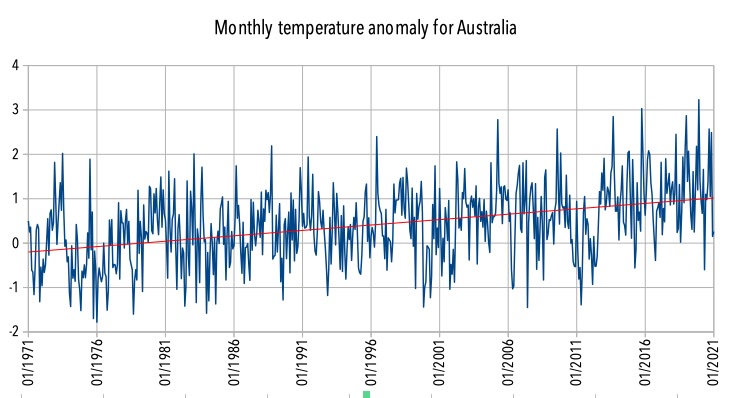Yesterday (February 3, 2021), Craig Kelly referenced a report of cold weather in Britain, then asked the question: “Is this the start of a period of global cooling ?”
Here’s three simple reasons why this is very unlikely.
Local ≠ global
Climate science predicts global warming. That means the average temperature over the whole world will keep increasing unless we reduce greenhouse gas emissions.
A cold snap in one country doesn’t mean that the whole world is getting colder.
One cold month doesn’t make a climate trend
Monthly temperatures vary greatly. This graph shows monthly temperatures in Australia for the past 50 years. (The world graph doesn’t look very different.)

The graph shows clearly that there is a trend of increasing temperature, just over 1 degree Celsius over this 50 year period.
But the graph also shows great variability about that trend. Individual months can be up to 2 degrees above or below the average trend. At times apparent short term trends of faster temperature rise or a cooling temperature occur, but these don’t last for long. But the longer term trend continues.
It would thus be foolish to think a single very cold month (such as occurred, for example, in June 2007), or even a sequence of cold months (as occurred in February to June 2011), was a sign of a change in trend.
Trends require many years to establish, not months.
So Britain’s cold snap alone cannot be an indication of a trend or a change.
Understanding the science
Climate science isn’t just built on trends in graphs.
Climate science is built on an understanding of the laws of physics, built into climate models. These models show that the temperature is rising because of physical factors – principally the increasing concentration of greenhouse gases in the atmosphere. This science has been known for about 150 years, and has been refined in recent years.
An occasional cold month doesn’t change the science and doesn’t change the fact of increasing greenhouse gas concentrations.
Conclusion
Mr Kelly’s question has a simple answer. The science indicates that global temperatures will continue to rise. The data confirms this. It is very unlikely that global cooling will occur in the next few years.
It would be extremely foolish to think one cold month in the UK was a sign of anything other than the variability of the weather.

is anomaly synonymous with bullshit?Why no raw data?
In the graph, “anomaly” means the departure from the previous mean. In this case the mean was 1961-1990. So the average temperature is slowly rising above the 1961-1990 average. You can see the BoM data in the link under the graph. Thanks for your question.